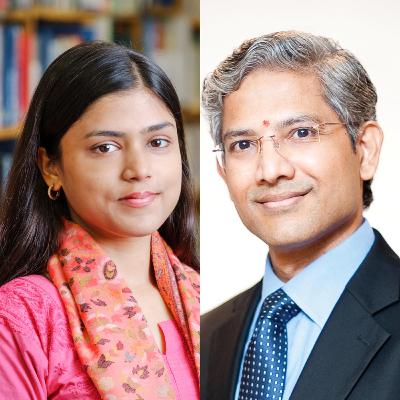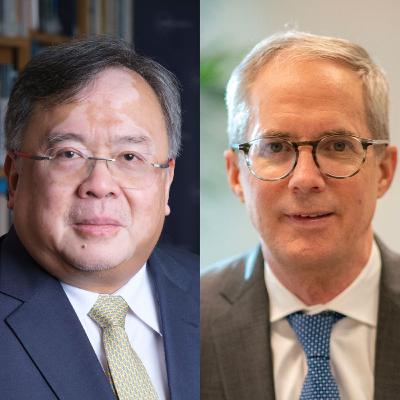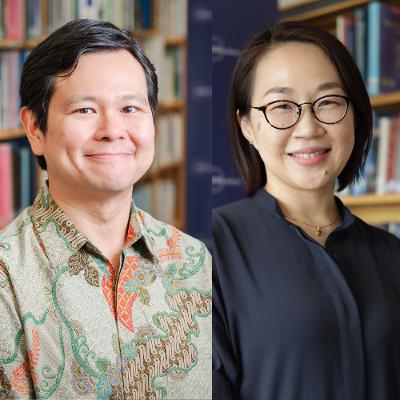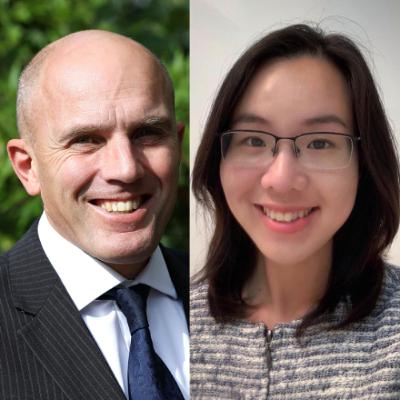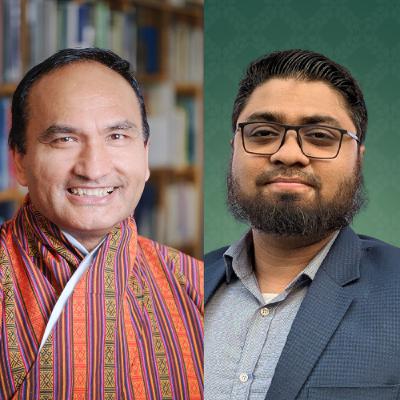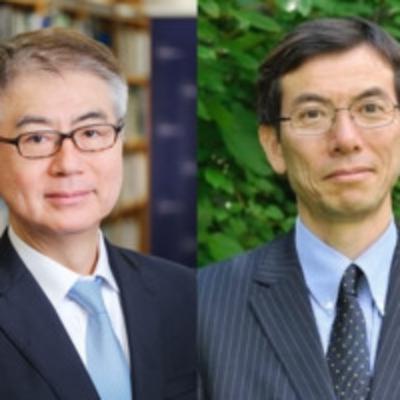Discover Asia's Developing Future
Asia's Developing Future

Asia's Developing Future
Author: Asian Development Bank Institute
Subscribed: 361Played: 3,589Subscribe
Share
© Asian Development Bank Institute
Description
ADBI is the think tank of the Asian Development Bank. We conduct policy research and capacity building to drive sustainable development in Asia and the Pacific.
295 Episodes
Reverse
Dr. K.E. Seetharam, Senior Consulting Specialist at the Asian Development Bank Institute, and Dr. Sakshi Pandey of the Capacity Building Commission, Government of India, explore Asia’s triple burden of malnutrition: urban obesity, rural undernutrition, and widespread micronutrient deficiencies. Drawing on case studies and insights from their recent book, they examine how urbanization, evolving food systems, and socio-economic disparities are reshaping public health across the region. Script: adbi.me/4m4p078
With global fragmentation on the rise, ADBI Dean Bambang Brodjonegoro and ADB Vice-President for East and Southeast Asia, and the Pacific, Scott Morris explore how Asia and the Pacific can boost resilience and forge a bright future through cross-border integration.
Read the transcript: https://adbi.me/3GN3zIh
As scams and cybercrime soar in the digital age, financial crime has become a moving target. Shawn Hunter, research fellow at Griffith Asia Institute, and Louis de Koker, a professor of law at La Trobe University, explain how new technologies, outdated frameworks, and regulatory gaps affect everything from financial inclusion to cross-border cooperation in Asia and the Pacific.
Script: https://adbi.me/3T5D5V1
In this episode of Asia’s Developing Future, Daniel Suryadarma and Takiko Igarashi from ADB Institute explore how Asia can tackle its growing education crisis where 70% of 10-year-olds in developing countries struggle with basic reading.
Script: https://adbi.me/3STBD7Y
Governments are some of the biggest buyers of construction services, putting them in a powerful position to shape a more sustainable future. In this episode, Andrew Minson, Concrete and Sustainable Construction Director at the Global Cement and Concrete Association, and Jenny Yan Yee Chu, Procurement Specialist at the Asian Development Bank explore how sustainable public procurement can change industry, spark sustainable growth, and build a low-carbon future for Asia and the Pacific.
Script: https://adbi.me/3Ya2UGq
Globally, smallholder farmers account for over 80% of farms and are estimated to produce around one-third of the world's food, but with climate change, economic shocks and environmental degradation to contend with what does the future hold for the people who feed billions around the world? ADBI senior research fellow Dil Rahut and Imtiaz Farhan Bin Habib, CEO and co-founder of Agronochain, explore the innovations and policies that can secure the future of smallholder farmers.
Script: https://adbi.me/3XXUKk6
If you don’t know what InsurTech is, you should. Listen to global insurance expert Susan Holliday explain how this dynamic area of FinTech is shaking up the industry, and how it can support sustainable development and address Asia and the Pacific’s protection gaps.
How can smart ports drive sustainability and development? ADB’s Yesim Elhan-Kayalar and maritime expert Eleanor Hadland explore how AI and other digital innovations are transforming ports, reducing emissions and can help countries in Asia and the Pacific achieve their sustainability goals.
Estimates suggest that only 15% of Asian assets have appropriate coverage for disaster risks. How can these “protection gaps” be filled? Yoshihiro Kawai, Chair of Global Asia Insurance Partnership and Tetsushi Sonobe, Dean of ADBI discuss the issue and how a new joint project aims to increase risk resilience.
The first World Conference on Creative Economy, held in Indonesia in 2018, paved the way by emphasizing the critical role of creativity in driving economic growth and fostering global collaboration. Join ADBI's James Correia and Sheena Leong explore the transformative power of the creative economy and its potential to shape a sustainable and inclusive future.
Climate change is likely to have catastrophic repercussions on human health, with health costs amounting to between $2 billion - to $4 billion a year. Estimates also suggest that the economic burden of climate change could rise to a staggering $54 trillion with just a 1.5°C rise. Join Nitya Mohan-Khemka, director of strategic initiatives with PATH as she unpacks the urgent actions and potential solutions needed to climate-proof health care systems.
Cutting-edge technology alone can’t solve the existing and emerging issues of water resources management. That’s why in this episode of Asia’s Developing Future we delve into the key role culture has in tackling water scarcity, promoting conservation and ensuring successful, sustainable water resources projects. Featuring insights from Yoonjin Kim, Director of Strategy and Development of the World Water Council, and Victor Shinde, Head of the Climate Center for Cities at the National Center of Urban Affairs in New Delhi, don’t miss this essential discussion on incorporating tradition with innovation.
Join independent science journalist Disha Shetty, recent winner of ADBI’s Developing Asia Journalism Awards, and Suling Lin, senior columnist from The Straits Times, as they discuss the challenges facing journalists reporting on development issues in an ever-changing news environment, and how collaboration with research organizations can amplify their impact.
Hybrid working is a win-win for employers and employees, says Professor Nicholas Bloom, but why hasn’t it taken off in many parts Asia and the Pacific? The economist from Stanford University shares his thoughts and latest research in a discussion with ADBI.
From machine learning to Blockchain, clean tech organizations are exploring innovative ways to support the adoption of renewable energy sources while also addressing energy poverty.
In this episode, Onon Bayasgalan, Chief Sustainability Officer for URECA talks about their project in Ulaanbaatar, Mongolia, that is empowering women-led households by switching from coal to solar power and giving them access to the carbon credit market to finance their energy transition.
Women entrepreneurs make a significant contribution to the Indian economy. However, access to formal finance is a crucial barrier to the growth of women-owned businesses.
In this podcast, Renana Jhabvala, the President of SEWA, the Self-Employed Women’s Association, will explain the policy tool that the Indian government has been implementing to formalize women’s economic participation and her experience with SEWA in utilizing bridge institutions to connect women entrepreneurs and formal banking sector.
Transcript: adbi.me/3vHsHdB
Almost two million households across Central Asia suffer from energy poverty according to the World Bank. The challenges are to maintain and provide infrastructure in rural parts of the region and explore new energy models for social inclusion and just transition.
In this podcast, ADBI Senior Research Fellow Dina Azhgaliyeva, Zhanna Kapsalyamova from Nazarbayev University, and Anna Arkhangelskaya from the Institute of Energy under the Kyrgyz Technical University explain socio-economic disparity that energy-poor households face and discuss policy options to replace inefficient fossil fuel subsidies while minimizing the impact of energy prices on vulnerable households.
Script: adbi.me/46zOLU9
By 2050, the global number of persons above 65 years old will double to over 1.5 billion, according to the United Nations, and Asia will continue to have the largest share of the world’s aged population.
In this podcast, Waseda University Associate Professor, Upalat Korwatanasakul provides an overview of demographic transition and its effects on fiscal balance in Asia. He also examines ways to enhance fiscal space against pension as well as how fiscal sustainability can be achieved in economies at varying demographic stages.
Script: adbi.me/3FTV1LJ
In this episode of Asia’s Developing Future, Keio University professor Sayuri Shirai, a former Bank of Japan Policy Board member and ADBI visiting fellow, explains the role of central banks in promoting green central banking and climate-related monetary policies in developing Asia.
She stresses the importance of improving awareness of financial institutions, conducting climate scenario analysis, and implementing standardized climate-related disclosures to draw more direct investment to emerging economies in Asia.
Script: adbi.me/3RlxOJa
In this podcast, the Asian Development Bank Institute’s Santi Setiawati spotlights Japan’s innovative sanitation and wastewater management systems and the implementation lessons they offer developing countries in Asia seeking to address coverage gaps within the sector.
The discussion is based on the ADBI policy brief The Financial and Institutional Mechanism of the Sanitation and Wastewater Management System: Learning from the Japanese Experience.
Transcript: adbi.me/45dhYVm


